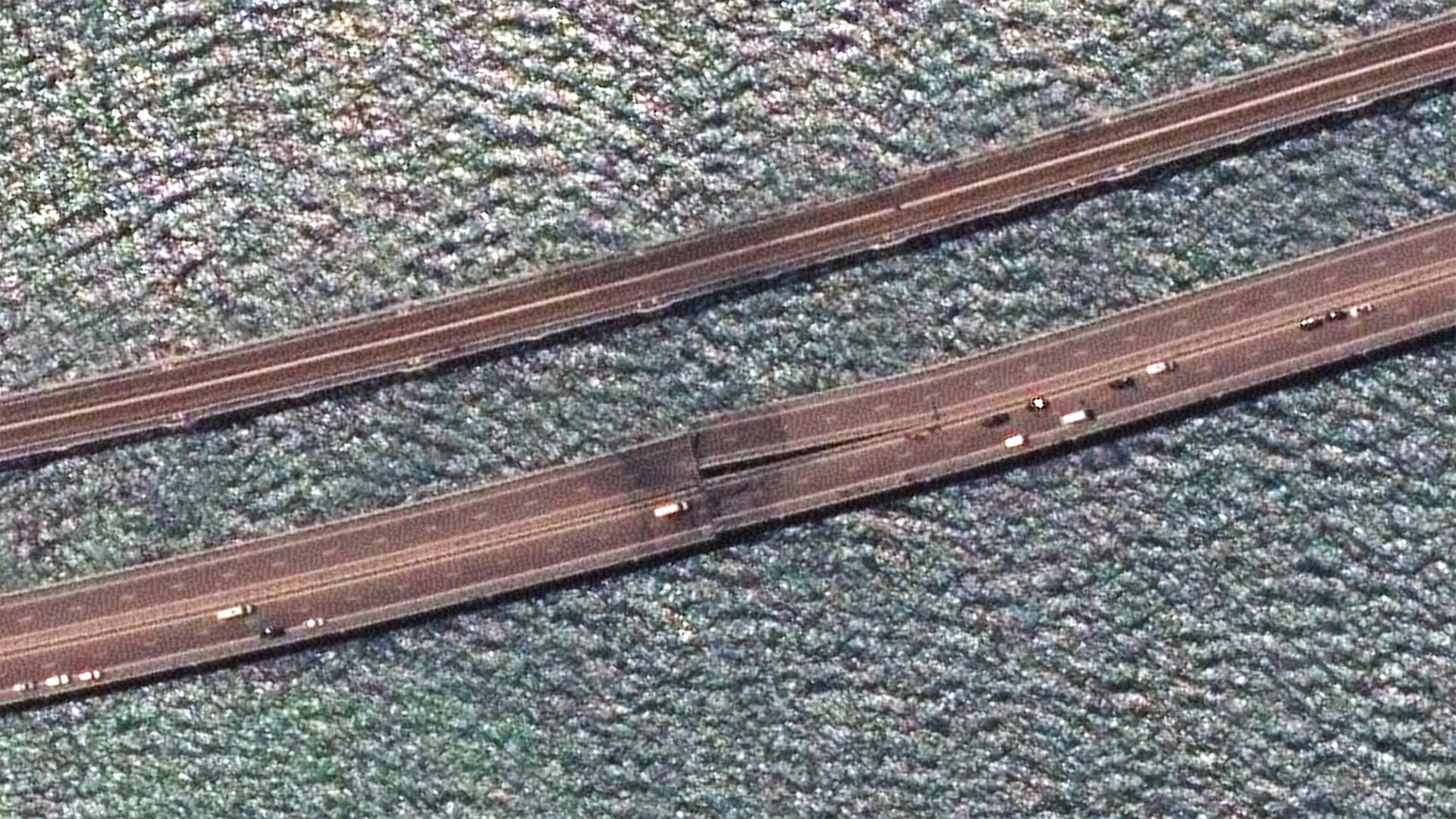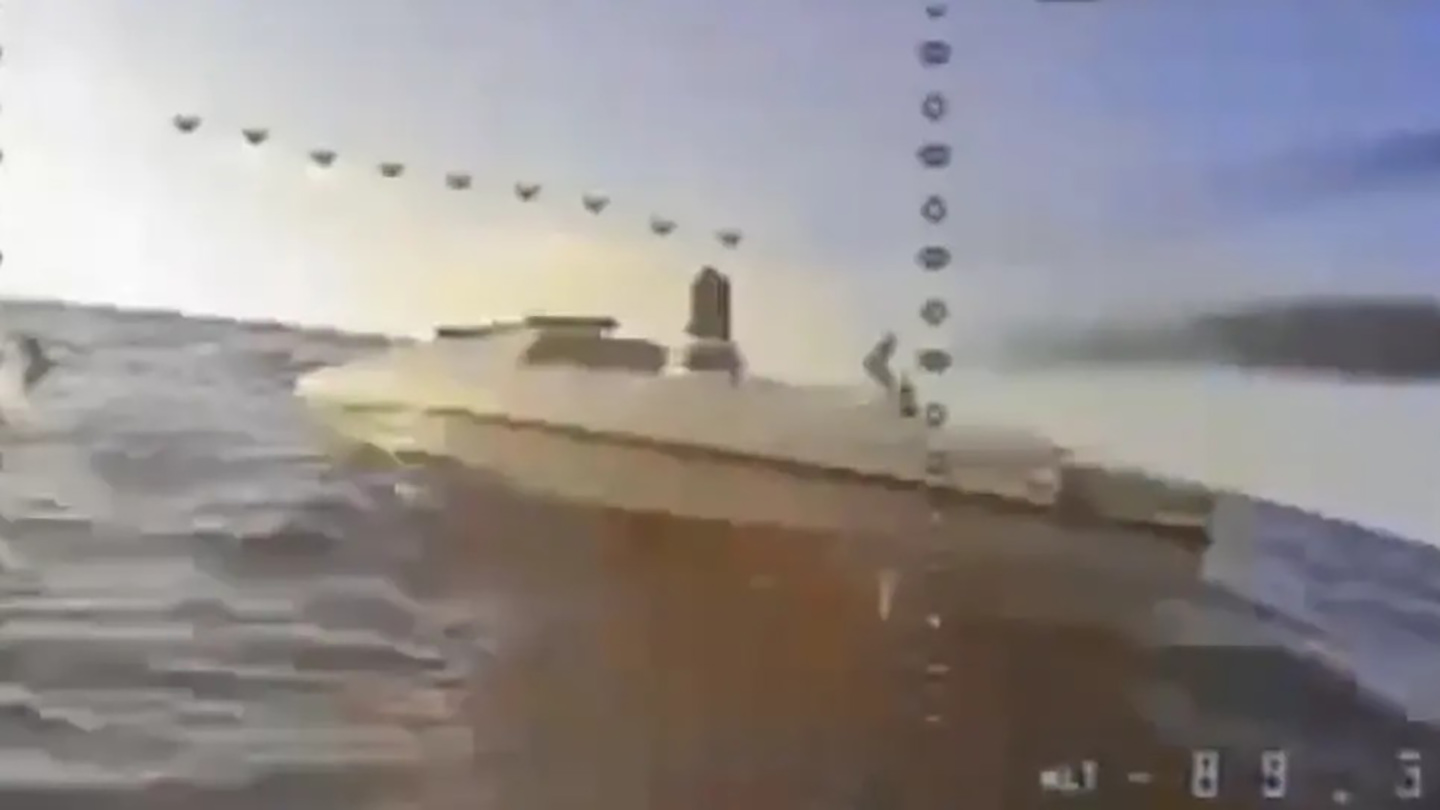The ongoing drone wars in Ukraine may be entering yet another new phase. Video has emerged showing what is claimed to be a Russian First Person-View (FPV) drone attacking a Ukrainian uncrewed surface vessel (USV). It is the first time we have seen this kind of engagement.
The 13-second video shows the FPV drone, rotors spinning, make a low approach toward the USV and crash into its port side. The video is undated and the Russian Telegram channel that first posted it implies that it took place on the Black Sea.
“This is when our guys can do it in a way that none of your foreign instructors can do for a lot of money,” wrote the Russian Tactical_13 Telegram channel, which posted the video today. “It’ll be this way forever. Glory to the Black Sea Fleet!”
The drone boat seen in the video appears to be the Ukrainian MAGURA V. We can’t say for certain if this was an actual strike or a staged event. Russia has claimed to have captured at least one MAGURA V and these boats have been used in large numbers against Russian naval interests.

We showed the video to Lt. Gen Kyrylo Budanov, head of Ukraine’s Defense Intelligence Directorate (GUR), who had never seen it before. He said the USV appeared to be a MAGURA V drone that was static in the water and had been lost at sea in a previous attack. However, he said Ukraine has lost a number of USVs to FPV drones already in attacks beginning a couple of months ago. He would not say how many have been lost that way.
Budanov shrugged off the FPV attacks.
“No,” he said when asked if they concern him. “They’re just drones.”
Regardless, it’s indicative of a natural evolution in drone warfare in the conflict, where FPV drones, which have come to dominate the battlefield, move to the maritime interdiction environment focusing on countering Ukrainian long-range drone boat attacks. Aerial suicide drones have been used to attack boats before, but it’s the first time we have seen them used against a USV.
FPV drones have limited range and require continuous line-of-sight communications with their controllers, but for defending the approaches to key coastal areas, they are relevant. This is especially true because their range can be maximized due to the lack of terrain to interfere with their signal. Antennas elevated on shore, as well as aerial relays that can come in form of other drones, manned aircraft, or even aerostats, can extend their connectivity even further. Basically, they are capable of hunting for approaching drone boats while also acting as precision guided munitions that are nimble enough to chase them down and destroy them, although it’s always harder than it looks. In the case of the video above, the target looks largely stationary.
The threat posed by Ukrainian drone boats is only expanding as the assault on Russian-occupied Crimea heats up.
A little more than a week ago, we wrote about how Ukraine has equipped its widely used Sea Baby USV with Grad-series artillery rockets. The rocket-armed boat has reportedly already been used to engage Russian vessels, although bombarding the shore is a far more plausible use. An unnamed SBU source told The Kyiv Independent that the rocket-armed USV was used in combat “against Russian positions on the Kinburn spit,” a thin stretch of coastal land near Mykolaiv on Ukraine’s southern Black Sea coast. “This technological solution is already showing powerful results,” the source said, adding that “new surprises await the enemy.”

Earlier this month, we reported that Ukraine began rigging USVs with repurposed heat-seeking air-to-air missiles. That seems to have been designed to provide the USVs with protection (or a measure of deterrence) against the Russian helicopters and fixed-wing aircraft that are increasingly being used to counter them. You can see one such encounter in the video below.
Kamikaze USVs were largely pioneered by Iran, which then transferred the technology to Houthi militants in Yemen. These weapons really came into their own in the course of the ongoing conflict in Ukraine. The country’s fleet of MAGURA V and other models destroyed or damaged multiple Russian warships and were used in the July 17, 2023 attack on the Kerch Bridge, Vladimir Putin’s prized $4 billion span connects Russia with the occupied Crimean peninsula.

Ukraine has become a laboratory for lower-end drone warfare in general. In addition to striking troops and equipment, drones eventually began to battle each other in the sky. The first such videos claiming to show those encounters began to emerge in October 2022. You can see one purported aerial drone duel in this video below.
These weapons are providing an asymmetrical advantage to a nation that has no real Navy anymore, with Ukraine continuing to press its USV attacks. Budanov told us the GUR carried out another such attack against Russian warships in Crimea overnight, destroying four KS-701 Tunets class high-speed amphibious transport vessels. The War Zone could not independently verify that assertion. You can see that attack, which the Russians tried to repel with fixed and rotary wing aviation, as well as small arms, in the video below.
As we have said for years, in many cases, one of the best ways to counter an unmanned craft is with another unmanned craft. This can be types operating in the same domain or in different domains, such as the FPV drone versus the drone boat as seen in the video. As these systems gain more autonomy, this new reality of modern warfare will become much more pronounced.
“The systems are being modernized,” Budanov said during a recent forum. “Technologies are being mastered. New technologies are emerging. Over time, we will probably see the complete dominance of unmanned vessels over conventional warships. At least in closed or semi-closed waters, such as the Black Sea, the Mediterranean, etc. This is definitely the way forward.”
As for defending shores from USVs with small explosive laden aerial drones, this may be one of the first examples of the tactic, but it is bound to quickly become a staple of coastal defense not just in the war in Ukraine, but elsewhere around the globe.
Author’s note: Tyler Rogoway contributed to this report.
Contact the author: howard@thewarzone.com
